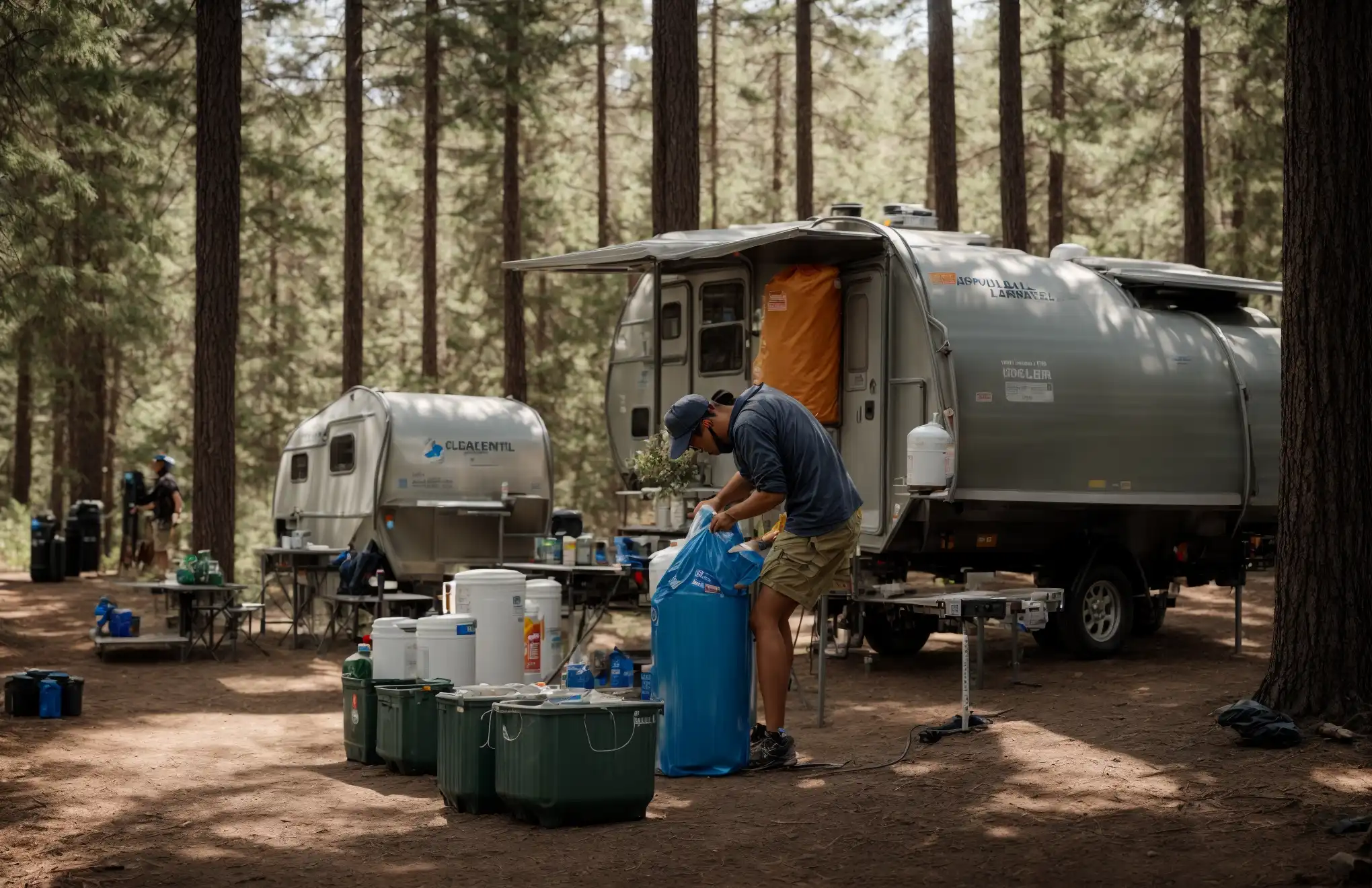How to Dispose of Empty Camping Propane Tanks
To dispose of empty camping propane tanks, take them to a local hazardous waste disposal facility or recycling center. Ensure they are completely empty before disposal.
Planning to discard those empty camping propane tanks after an adventurous trip? Dealing with propane tanks properly is crucial as they represent a hazardous waste category due to the remaining gas traces and pressurization. Campers and outdoor enthusiasts often use these tanks for cooking and heating, but once empty, the disposal becomes a responsibility.
A common concern is the environmental impact, so finding an eco-friendly method is essential. An empty propane tank shouldn’t just be tossed in the trash – it requires a specific disposal method to ensure safety and environmental protection. By taking the right steps for disposal, users can effectively reduce potential hazards and contribute to a sustainable environment. This introduction frames the importance of disposing of propane tanks properly while giving clear, actionable information on where to start.
About Propane Tanks in Camping
Embracing the great outdoors often involves camping essentials, and among these, propane tanks emerge as a pivotal source of energy. These portable containers fuel various camping devices, such as stoves, heaters, and lanterns, providing a level of comfort and convenience to adventurers. As vital as they are to outdoor experiences, propane tanks require conscientious handling once emptied. Knowledge of safe disposal practices becomes key to ensuring environmental sustainability and adhering to safety regulations.
Importance of Safe Disposal of Propane Tanks
Ensuring the proper disposal of empty propane tanks is not only a legal obligation for campers but also a commitment to safety and environmental protection. Incorrect disposal can lead to hazardous situations, from fires and explosions to the release of harmful chemicals into the environment. Conscious disposal helps in mitigating these risks.
Environmental Impact of Improper Disposal
Improper disposal of propane tanks poses significant environmental threats. When left in landfills, these tanks can corrode, releasing pollutants into the ground and atmosphere. The potential contamination of soil and waterways harms wildlife and disrupts ecosystems. Environmentally responsible disposal ensures preservation and respect for nature’s balance.
Overview of Common Types of Camping Propane Tanks
Camping propane tanks come in various sizes and types, tailored to diverse camping needs. The most common types include:
- Single-Use Cylinders: Compact and convenient for short trips.
- Refillable Cylinders: A sustainable option for frequent campers.
- Disposable Mini Tanks: Ideal for space-saving and lightweight packing.
Each type varies in material and reusability, influencing the method of disposal. Familiarity with the kind of tank you possess will guide the correct approach to discarding it responsibly.
Understanding Propane Tank Disposal Laws and Regulations
Understanding the laws and regulations surrounding propane tank disposal is crucial for campers and outdoor enthusiasts. Propane tanks, a popular source of fuel for grilling and camping, must be disposed of in a safe and legal manner to avoid environmental harm and potential legal repercussions. Familiarizing oneself with the federal and state regulations, as well as local municipal policies, ensures proper disposal and demonstrates a commitment to environmental stewardship. Let’s dive into the specifics of these regulations to guide you through the responsible disposal of your empty camping propane tanks.
Federal and State Level Regulations
At the federal level, the Resource Conservation and Recovery Act (RCRA) oversees the disposal of hazardous waste, including certain types of propane tanks. The Department of Transportation (DOT) also provides guidelines for the transportation of hazardous materials. While most small, non-refillable propane tanks are exempt from these regulations, it’s important to check for any specific state laws that might apply. States may have tighter rules, and compliance with all relevant regulations is essential for legal and safe disposal.
Municipal Waste Policies on Hazardous Materials
Local municipal waste policies can vary greatly, but many classify propane tanks as hazardous materials. It’s essential to check the policies of your local waste management facilities to find out if they accept propane tanks and under what conditions. Some municipalities require residents to bring propane tanks to a hazardous waste collection event or facility, while others have special disposal processes in place for these items. Never place propane tanks in your regular trash or recycling bins without checking local guidelines first.
Specific Rules For Recreational and Small Tanks
When it comes to the disposal of recreational and small propane tanks, special rules often apply. These tanks are widely used in camping and portable grilling. In some regions, it’s mandatory to completely empty the tanks and remove any attached valves before disposal. This ensures that there is no residual gas that could pose a risk during the waste management process. Other areas might offer exchange programs, where you can bring your empty tank and receive a full one for a reduced price or even for free. Always check with local authorities to adhere to safe and legal disposal practices for these tanks.
Preparing Propane Tanks For Disposal
When the final embers of your campfire burn out and it’s time to pack up your gear, disposing of empty propane tanks in a safe and responsible way is a crucial step. Navigating the proper disposal methods not only helps protect the environment but also ensures you adhere to legal regulations surrounding hazardous waste. Let’s walk through the correct process to prepare your propane tanks for disposal.
Ensuring Tanks are Completely Empty
Before disposing of any camping propane tank, confirm that it’s completely empty. Any remaining gas can pose a danger to garbage handlers and the environment. Here’s what you should do:
- Detach the tank from any appliances, ensuring the valve is fully closed.
- Use the remaining gas by attaching the tank to a propane appliance until it stops running.
- For small, non-refillable cylinders, consider using a device specifically designed to ensure they are empty.
Removing Or Marking Non-refillable Tanks
Most non-refillable propane tanks should not be thrown in the regular trash. To properly prepare these tanks:
- Identify non-refillable tanks by their distinctive single-use design and labeling.
- Make sure you remove or clearly mark them to indicate they are empty. This is crucial for the safety of those handling the tanks afterward.
- Check with local regulations as some areas require puncturing and recycling, while others have special collection programs for these tanks.
Handling Refillable Propane Tanks
For larger refillable tanks, here’s a safe disposal checklist:
| Step | Action |
|---|---|
| 1 | Empty the tank as described above. |
| 2 | Check for local propane retailers or exchange programs that accept old tanks. |
| 3 | If the tank is outdated or damaged, retailers may dispose of it or offer a discount on a new tank. |
| 4 | For tanks that are in good condition, consider donating to a local refill program or second-hand store. |
Options For Disposing of Empty Propane Tanks
Options for Disposing of Empty Propane Tanks are critical for campers committed to preserving nature’s serenity and preventing environmental hazards. Whether wrapping up a weekend getaway or returning from a lengthy expedition, the safe and responsible disposal of used propane tanks must be a priority. Below, explore the various avenues to ensure that these tanks do not become a burden on the ecosystems we cherish.
Recycling Facilities and Policies
Identifying a local recycling facility equipped to handle empty propane tanks is the first step towards responsible disposal. Before visiting, confirm that the facility accepts such items, as not all are capable of processing hazardous materials. Once established, adhere to the following guidelines:
- Check for residual gas: Ensure all propane is expended, to prevent any accidents during the recycling process.
- Remove attachments: Detach any connecting pieces or valves that may interfere.
- Proper labelling: Some facilities require a label indicating that the tank is empty and safe to handle.
- Follow drop-off instructions: Adhere strictly to the facility’s drop-off procedures for hazardous materials.
Household Hazardous Waste Collection Programs
Local governments often sponsor Household Hazardous Waste (HHW) collection programs that accept empty propane tanks. Participation in these programs contributes to ecological sustainability and public safety. Schedule and location details usually become available on municipal websites or via community bulletins. Remember:
- Mark your calendar for designated collection days.
- Gather all HHW items to dispose of them together.
- Store your empty tanks in a well-ventilated area until the collection day.
Exchange Programs For Refillable Tanks
Embrace an environmentally conscious approach by engaging in Exchange Programs offered by many retailers for refillable propane tanks. This not only aids in reducing waste but also often provides a cost-effective alternative to purchasing new tanks. Here’s how to participate:
| Step | Action |
|---|---|
| 1 | Locate a nearby vendor offering tank exchanges. |
| 2 | Bring your empty tank to the store. |
| 3 | Receive a pre-filled tank in exchange for a nominal fee. |
With these options for disposal, campers can enjoy their adventures without leaving a harmful trace on the environment, ensuring that the natural beauty that inspired their journey remains intact for the future.
Read more: How to Use Camping Coffee Pot
Safe Disposal Best Practices and Alternatives
When the s’mores have been eaten and the campfire embers have cooled, responsible campers need to address the question of how to dispose of their empty camping propane tanks. Whether you are a weekend warrior or an extended trip enthusiast, understanding the safe disposal best practices and alternatives for your propane canisters is crucial for both environmental stewardship and personal safety. The following sections offer essential tips and strategies to manage empty propane tanks post-adventure.
Proper Transportation and Storage of Empty Tanks
After a camping trip, transporting and storing empty propane tanks safely is your first concern. Start by ensuring the valve is completely closed to prevent any residual gas from leaking. Secure the tanks upright in a well-ventilated area of your vehicle, away from direct sunlight and heat sources. For storage, select a cool, dry location, preferably outdoors. Always keep them out of reach of children and pets. This not only averts potential accidents but also preps the tanks for proper disposal.
Seeking Professional Assistance For Disposal
Disposing of propane tanks isn’t as simple as tossing them in the trash. It requires professional assistance. Contact local hazardous waste facilities, gas suppliers, or camping stores as they often provide disposal services or can guide you to the nearest disposal site. In some regions, community hazardous waste programs might schedule specific drop-off days dedicated to collecting such items. Remember, proper disposal through professionals ensures environmental safety and legal compliance.
Considerations For Reducing Propane Tank Waste
Reducing waste is just as important as proper disposal. Campers can take measures to minimize propane tank waste by:
- Investing in refillable tanks which have a longer lifespan and can be reused numerous times.
- Opting for larger tanks if consistent long-term camping is planned, reducing the number of small canisters used.
- Utilizing propane tank exchange programs which allow you to trade an empty for a full tank, lessening waste.
- Being conscious about propane usage, employing energy-efficient appliances, and ensuring all gas is used from a tank before considering it empty.
By following these practices, campers can significantly reduce the environmental impact of their outdoor leisure activities.
Also learn: How to Dispose of Camping Gas Canisters
Conclusion
Disposing of empty camping propane tanks requires attention to safety and the environment. Always follow local regulations and opt for recycling whenever possible. Remember, proper disposal isn’t just considerate; it preserves nature for future adventures. Ensure your camping legacy is a green one by responsibly handling propane tanks. Join us at Outdoor Awaits, where every camper finds their path. Especially check out our Learning section for more.







